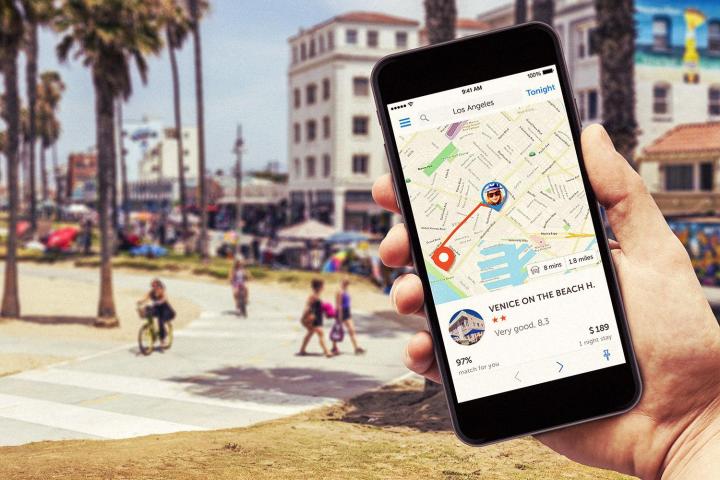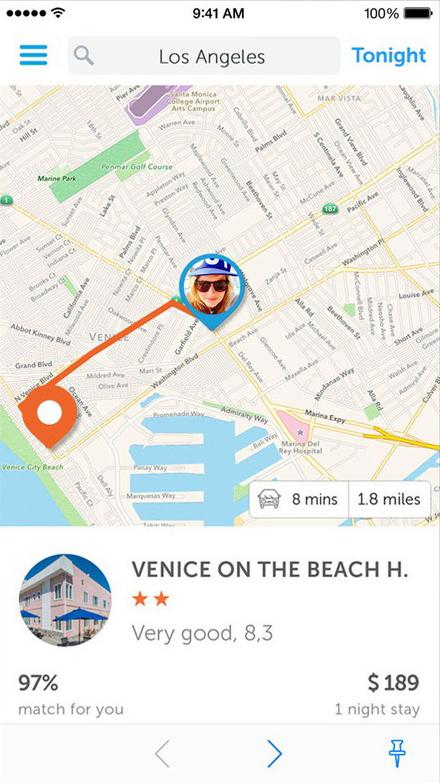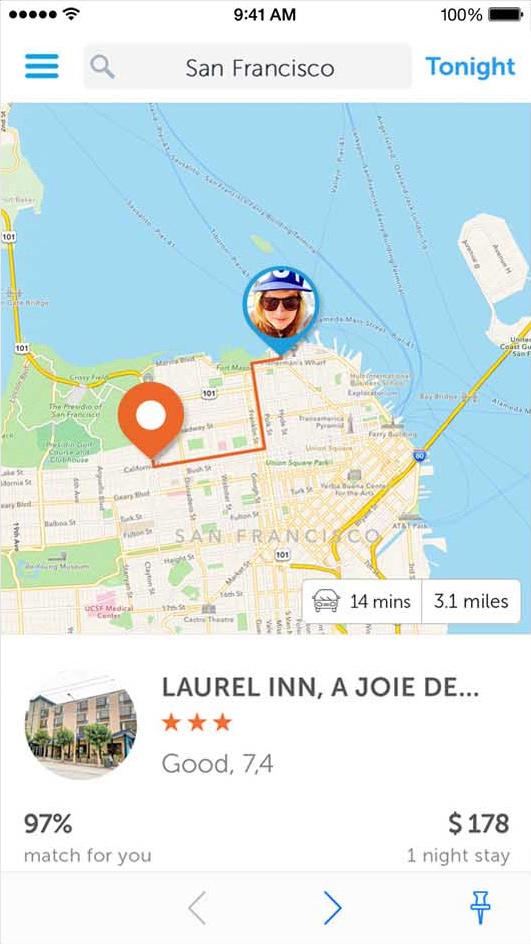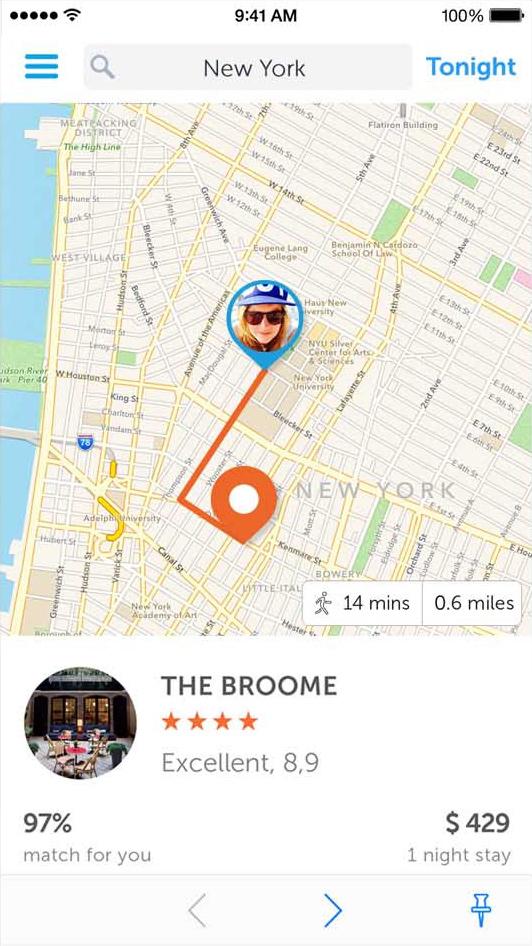
There are many occasions where we’ve scrambled to find a place to stay. Perhaps it’s missing that last train of the night after partying in the city, or a flight cancellation that’s left us stranded at an airport. It could be the arrival of unexpected guests at our studio apartment. Whatever the reason, the last-minute lodging needs is what Booking.com’s new Booking Now app for iOS is designed for.
Booking Now focuses on finding you a hotel in your vicinity (using your iPhone’s GPS), based on price, quality, and other preferences you’ve set up. Unlike Booking.com’s regular core app, Booking Now is about reservations within 48 hours, and it has a streamlined design. The app not only searches for available inventory and real-time prices (as the world’s largest website for reserving accommodations, Booking.com has info for more than 580,000 properties), but its search algorithms also factor in said preferences and previous hotel stays you’ve made on Booking.com. So it’s not just looking for the best deals, but a room that meets your requirements.
Spontaneous booking is becoming the norm, especially with the Millennial generation, who are increasingly using mobile devices for online transactions.
This isn’t how everybody books hotel rooms, which is why Booking.com has created a separate standalone app from its core app, catering to two different needs. But according to Darren Huston, president and CEO of the Priceline Group, which owns Booking.com, spontaneous booking is becoming the norm, especially with the Millennial generation who are increasingly using mobile devices for online transactions. According to the company’s research, nearly half of hotel reservations made within 48 hours are made through a mobile device. Think of Booking Now as the Uber of hotel booking.
“In 2011, we did a billion dollars of booking on mobile,” Huston says. “In 2012, we did 3 billion. In 2013, we did 8 billion. And in 2014, it’s pretty much doubled again. So mobile has happened so fast, that this last-minute scenario, where half of [hotel bookings] are done on the phone, became interesting to us.
“And at the same time, you had other things coming to fruition in what I call the spontaneous economy, that people are expecting they can do e-commerce on their phone in a very spontaneous way,” Huston adds, who, as former head of new ventures at Starbucks, started the Starbucks Card, which would later include an app-based component that’s all about spontaneous transactions.
Booking Now is not the first time Booking.com experimented with spontaneous reservations. The new app is the result of years of learning that stems from its original app, called Booking Tonight. When it was first launched three years ago – during what Huston jokingly calls the early days of mobile – Booking.com only had three people on its mobile team. As its mobile business grew, that division grew along with it to 150 employees. But Huston also knew that the mobile experience had to change.
“We came to the conclusion that we need to take the Booking Tonight app and really reinvent it with a brand-new interface that represents the kind of scenarios that happen within 48 hours,” Huston says. “We did a ton of research to say, what kind of things are being done, and there’s everything from ‘my flight got cancelled’ and ‘my house got flooded,’ to ‘I went to see a show in Times Square, and do I really want to take a train back to Connecticut.’”
But Huston says the app also addresses a new travel trend among young people, who don’t book anything in advance but air travel.
Booking Now looks like a “dumbed down” version of the core app, but its plumbing is complex.
“It’s called ‘Millennial wanderlust travel,’” Huston says. “(For example) they land in Paris, but they don’t book anything else, and they just wander off into France, England, or Italy to see secondary or tertiary destinations, to get away from the crowds. And they all have a computer in their pocket basically … they have a smartphone and they expect to do stuff with it.
“So we’re seeing more and more of this spontaneous booking where they just show up in a square like Rembrandt Square in Amsterdam and say, ‘OK, where do you guys want to stay tonight?’ They can use the app, and don’t have to walk into every front desk and say, ‘What are you charging?’”
And that’s what the app does. It eliminates the need to search through hundreds of hotel listings, or even tell it where you are, since it uses GPS to pinpoint your location. When you launch the app, it asks for your preferred price range. If you have an existing Booking.com profile, the app takes into consideration the things you like in previous bookings when it searches. Immediately, you are shown a map of where the hotel is and your distance from it. It lists the name, rating, and price (oftentimes they are last-minute special rates). The app shows one hotel at a time; to see the next choices, you simply swipe through. What hotels Booking Now shows is ranked in order by the percentage Booking.com thinks best matches your needs, and there are no other ways to sort them or see a list of all hotels at once. If you want more info on a particular property, you can swipe up for photos, details, fine print, and user reviews. You can quickly make a reservation, or pin it as an option if you are still searching.
For many travelers, Booking Now may be too simplistic. How does it really know if a property is the best match? What if there’s another property on the other side of town that’s a better fit? Are you really getting the best prices? But Huston tells us Booking Now is not for that type of a la carte customer who wants loads of options; for them, Booking.com has its core app for planned travel. Nor is it targeting the Priceline customer who is willing to “chance it” in exchange for a low price. Booking Now, Huston reminds us, is going after that spontaneous traveler – “the person who just wants a bed” – who it sees as a big part of its business. As you continue to use app, it constantly learns more about you – what you book, the hotels you pin, the properties you look at, what similar travelers search for, etc. It may seem like a “dumbed down” version of Booking.com’s core app, but its plumbing is complex, Huston says.
Booking Now is not just looking for the best deals, but a room that meets your requirements.
But it also adds a safety net for consumers who choose to be impulsive; with information, they don’t have to settle or feel trapped by the first hotel they randomly walk into. “As a consumer you have way more power than [randomly] walking into the door,” Huston says. Spontaneity doesn’t have to mean unwanted surprises.
Despite being a global company (Booking.com’s roots are in the Netherlands, but its presence is now worldwide), Huston says the company doesn’t have as big of a footprint domestically. The Booking Now app, from a marketing standpoint, is one way Booking.com could expand its U.S. presence, by catering to the mobile-tech-savvy traveler. In the immediate future, Huston says the app will roll out additional languages, and by the second-quarter of 2015 the company hopes to release an Android version. “Right now we have optimized getting feedback, while burying the complexity to keep it simple”
“We want to be part of those spontaneous things that happen around people’s phones, which generally involves young people but also professionals,” Huston adds. “[Spontaneous travel] is becoming more and more common, and we hope to generate some buzz around it.”




